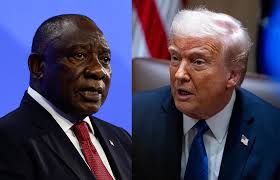
South Africa is reportedly considering adjustments to its Broad-Based Black Economic Empowerment (B-BBEE) regulations to facilitate Elon Musk’s Starlink satellite internet service, ahead of President Cyril Ramaphosa’s upcoming visit to Washington. This move aims to strengthen diplomatic and trade relations with the United States, which have been strained over issues such as land reform and support for Israel.
The Trump administration has previously granted refugee status to white South Africans and suspended aid to South Africa, citing concerns over alleged discrimination—a claim the South African government disputes .(EWN, The Times)
Starlink, operated by Musk’s SpaceX, has faced challenges entering the South African market due to the country’s B-BBEE laws, which require foreign companies to have at least 30% local Black ownership. SpaceX has argued that its global policies prevent such local shareholding, effectively barring entry into the market .
In response, South African officials have suggested the possibility of implementing “equity equivalents,” such as investments in skills development, as an alternative to direct ownership requirements .(The Daily Beast, The Star, TimesLIVE)
However, some political groups, including the Economic Freedom Fighters (EFF), have opposed any exemptions to the B-BBEE laws, emphasizing the importance of maintaining policies that address historical inequalities .(EWN)
As discussions continue, the outcome will likely influence not only Starlink’s operations in South Africa but also broader international perceptions of the country’s commitment to economic transformation and equity.(TimesLIVE)
This caused a lot of talk online. Some people agreed with Musk, but South African officials quickly said that the rule is not about skin color but about giving opportunities to those who were disadvantaged for many years. They want to make sure the country’s economy is fair for everyone.

Now, South Africa is planning to offer Starlink a way around the strict ownership rule. Instead of owning part of the company, Starlink could meet the BEE rules by doing other things. For example, they might invest in building internet infrastructure, train local people, or give satellite kits to schools and rural areas that don’t have good internet. This kind of deal has worked before with car companies like BMW and Toyota, which also found ways to support local communities without changing ownership.
The government says these changes are not just about helping Starlink. They want to make South Africa more attractive for foreign companies to invest and help more people get connected to the internet. Right now, many rural homes in South Africa don’t have internet at all, so Starlink’s technology could really help.
But some leaders worry that changing the BEE rules for Starlink might weaken the country’s efforts to support black South Africans. They say it’s important to keep the rules strong and not give special treatment to big foreign companies.
FAQs (Frequently Asked Questions)
1. Why is South Africa considering changing its BEE rules for Starlink?
South Africa is exploring adjustments to its Broad-Based Black Economic Empowerment (B-BBEE) rules to enable Starlink, Elon Musk’s satellite internet service, to legally operate in the country. Current BEE regulations require at least 30% Black ownership for telecom licenses, which Starlink does not meet. The government sees Starlink as a valuable tool for expanding internet access and is looking for alternative compliance methods.
2. What are the current BEE requirements that affect Starlink’s entry into South Africa?
The BEE regulations mandate that companies in certain sectors—including telecommunications—must have a minimum level of Black South African ownership to operate. Starlink’s parent company, SpaceX, follows a global policy that doesn’t allow local ownership, creating a regulatory barrier in South Africa.
3. What alternatives to direct Black ownership are being considered for Starlink?
The South African government is considering allowing Starlink to comply with BEE requirements through “equity equivalents.” These may include investments in skills development, education, or other programs that benefit Black South Africans, rather than requiring direct equity transfer or ownership.
4. Why is this move politically and diplomatically significant?
This change is seen as part of a broader diplomatic effort to improve U.S.–South Africa relations, especially ahead of key talks involving President Cyril Ramaphosa. Starlink’s approval could signal a willingness to balance economic transformation with attracting international technology and investment.
5. Are there any criticisms or opposition to these proposed changes?
Yes. Some political groups, including the Economic Freedom Fighters (EFF), oppose any exceptions to BEE laws, arguing that doing so undermines efforts to address economic inequality and historical injustices. Critics also warn that making exceptions for foreign companies could set a problematic precedent.
Let me know if you want these FAQs formatted for a report, website, or presentation.
